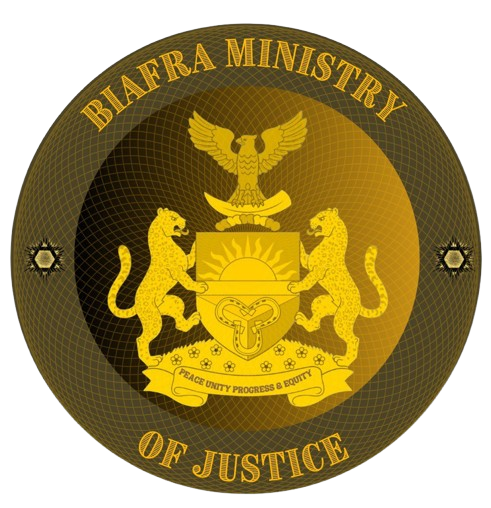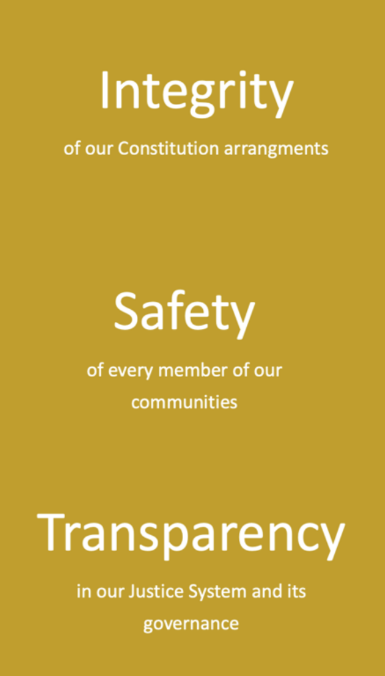Biafra Ministry of Justice
ABOUT
The Biafra Ministry of Justice is responsible for the authorities in the judicial system, including the Biafran Police, the Courts, Prosecution Services, legal aid through the Public, Defence Service, and the Biafran Prison and Probation Service. The Ministry is also responsible for migration issues.
The Ministry of Justice maintains and develops legal order and legal protection, reinforces the structures of democracy, and safeguards citizens’ fundamental rights. The Ministry is responsible for drafting the key legislation and maintaining legal order to ensure the proper functioning of the judicial system. Judicial powers are exercised by the independent courts.
In addition, the Ministry of Justice is responsible for legislation in the areas of constitutional and general administrative law, civil law, procedural law, criminal law, public order and safety, and migration and asylum law.
Vision & Mission
The Ministry of Justice is committed to integrity and honesty in governing our Justice System, striving to establish a trustworthy and reliable system for citizens. It is crucial to maintain a system that citizens can have faith in.
The Ministry of Justice is dedicated to creating safe communities for Biafrans by ensuring the presence of police throughout all regions of Biafra and minimizing delays in law enforcement response time.
Transparency is a core value for the Ministry of Justice, promoting accountability by oTering citizens full visibility into its operations. The Ministry aims to grant all citizens adequate access and insight to its processes and procedures.
Our goal is to build a justice system that is fair, equitable, and accessible to all, regardless of their background or status. We are committed to upholding the rule of law and ensuring that justice is not only done but is seen to be done. We uphold the rule of law through our daily work to ensure:
• Laws are clear, predictable, and accessible
• Laws are publicly made and the community can participate in the law-making process
• Laws are publicly adjudicated in courts that are independent of the executive arm of the government
• Dispute settlement is fair and eTicient where parties cannot resolve disputes themselves.
To achieve this, we will implement rigorous oversight mechanisms and engage in continuous dialogue with the communities we serve. By actively listening to the needs and concerns of our citizens, we can adapt and improve our services to better meet their expectations.
The Ministry of Justice will also prioritize the use of technology to streamline processesand enhance eTiciency. By adopting innovative solutions, we can reduce bureaucraticred tape and ensure that justice is delivered promptly and eTectively.
Ultimately, our vision is to create a justice system that embodies the principles ofintegrity, safety, and transparency. We invite all citizens of Biafra to join us in this endeavour, as together we can build a just society for future generations.
Looking Forward
The Ministry of Justice in Biafra will explore enhancing the utilization of AI to establish the most eTicient and impartial justice system in Africa, with ambitions to extend this model globally. This system will serve as a guiding framework for other African nations to adopt.
By leveraging advanced machine learning algorithms and comprehensive data analysis, we aim to eliminate human error and prejudice from judicial processes. This initiative will encompass a wide range of applications, from predictive policing to automated case management and even virtual courtrooms, ensuring that justice is not only served swiftly but fairly.
The rollout will include extensive training for legal professionals to adapt to these new technologies, as well as rigorous testing phases to guarantee the accuracy and reliability of AI systems. Public transparency will be a cornerstone of this transformation, with regular updates and open forums to address any concerns and gather feedback from citizens.






